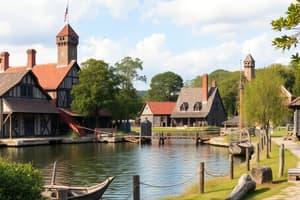Podcast
Questions and Answers
What was the primary cause of Bacon's Rebellion?
What was the primary cause of Bacon's Rebellion?
- Conflict between elite planters and indentured servants (correct)
- The desire for greater political representation from the backcountry settlers
- Disputes over religious practices between Puritans and other colonists
- Competition for land between settlers and Native Americans
Which of the following was NOT a direct consequence of the plantation system in the colonies?
Which of the following was NOT a direct consequence of the plantation system in the colonies?
- Development of a system of checks and balances in government (correct)
- Rise of a wealthy planter class
- Increased reliance on slave labor
- Growth of the tobacco industry in the South
What was the main motivation behind the Great Migration?
What was the main motivation behind the Great Migration?
- The desire to escape religious persecution
- The search for economic opportunity
- A vision of establishing a new society based on religious principles (correct)
- The pursuit of political freedom
Which of the following events was NOT a direct result of the growing tensions between colonists and Native Americans?
Which of the following events was NOT a direct result of the growing tensions between colonists and Native Americans?
What was the main purpose of mercantilism?
What was the main purpose of mercantilism?
How did the Mayflower Compact impact the development of government in the colonies?
How did the Mayflower Compact impact the development of government in the colonies?
What was the significance of the Stono Rebellion?
What was the significance of the Stono Rebellion?
How did the triangular trade contribute to the growth of slavery in the colonies?
How did the triangular trade contribute to the growth of slavery in the colonies?
Flashcards
Triangular Trade
Triangular Trade
A system of trade that involved the exchange of goods between Europe, Africa, and the Americas. It led to the transportation of enslaved people from Africa to the Americas, export of goods from America to Europe, and import of goods from Europe to Africa.
Mayflower Compact
Mayflower Compact
A document signed by 41 men on the Mayflower, establishing a basic government in Plymouth Colony. It was a significant step towards self-governance.
Great Migration
Great Migration
The migration of Puritans to New England, which resulted in tension with other groups due to differing religious beliefs.
Slavery in the Colonies
Slavery in the Colonies
Signup and view all the flashcards
Mercantilism
Mercantilism
Signup and view all the flashcards
Stono Rebellion
Stono Rebellion
Signup and view all the flashcards
Metacom's War
Metacom's War
Signup and view all the flashcards
Bacon's Rebellion
Bacon's Rebellion
Signup and view all the flashcards
Study Notes
Apush Midterm Unit 1
- Colonial Economies: Plantations in the Southern colonies relied heavily on slave labor and cash crops like tobacco.
- Labor Systems: Indentured servitude and the importation of enslaved Africans provided labor for the growing colonies. Conditions for enslaved people were often cruel.
- Colonial Conflicts: Conflicts arose between colonists and Native Americans, as well as disagreements between colonists themselves. Examples include Bacon's Rebellion and King Philip's War.
- Religious Freedom: Some colonies were established to provide religious freedom for specific groups, like the Puritans in Massachusetts.
- Colonial Government: Colonial governments often had differing structures and levels of participation by colonists. The Mayflower Compact was an early example of self-governance.
- Economic Motivations: Factors like the demand for resources and raw materials influenced migration and settlement patterns. Colonists might seek to profit by farming tobacco, or secure economic opportunities elsewhere.
- Social and Political Tensions: Disagreements over religious practices, land ownership, and governing structures created tensions among colonists and between colonists and Native Americans.
- Impact of Mercantilism: European policies like mercantilism impacted the colonists' economy and trade.
Apush Midterm Unit 2
- Puritan Beliefs: Puritanism influenced the religious and social values of New England colonies. The belief systems centered on the separation of church and state.
- Religious Conflicts and Dissidents: Disagreement amongst the Puritans and other religious groups led to conflicts and the expulsion of dissenters, who were forced to move elsewhere. Examples include Anne Hutchinson and Roger Williams.
- Economic and Political Structures: The New England colonies developed a variety of economic and political structures. These differed based on factors like the values of its colonists.
- Native American Relations: Conflicts between colonists and Native American tribes over land and resources were common in colonial society.
Apush Midterm Unit 2 continued
- Southern Colonies' Development: Southern colonies developed different economic systems; agriculture focused on plantations using enslaved labor led to social and political differences from other colonies.
- Mercantilism's Impact: European policies like mercantilism influenced the Southern colonies' trade relationships with Europe.
- Colonial Slavery: The institution of slavery developed, and grew in the Southern colonies, driven primarily by economic concerns related to cash crop production. This institution led to further social and political division.
- Triangular Trade: The network of trade connecting Europe, Africa, and the Americas is known as the triangular trade. It led to increased migration of Africans and the exchange of goods.
Studying That Suits You
Use AI to generate personalized quizzes and flashcards to suit your learning preferences.




